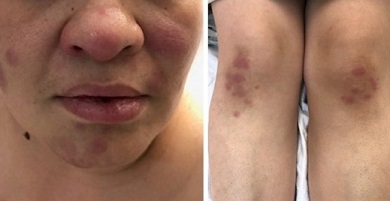BREAKING COVID-19 News! SARS-CoV-2 Infections And COVID-19 Vaccines Can Also Cause Kikuchi Disease!
Nikhil Prasad Fact checked by:Thailand Medical News Team Nov 22, 2023 2 years, 3 months, 1 day, 22 hours, 10 minutes ago
COVID-19 News: The global landscape of the COVID-19 pandemic has been marked not only by the relentless spread of the virus but also by the continuous evolution of our understanding of its varied impacts on health. Recent revelations in the medical community have illuminated an unexpected connection between SARS-CoV-2 infections, COVID-19 vaccines, and a rare medical condition known as Kikuchi Disease (KFD). This emerging link, documented in a growing number of case reports and studies, underscores the need for a comprehensive exploration of the interplay between these elements.

Kikuchi Disease, also referred to as Kikuchi-Fujimoto disease or histiocytic necrotizing lymphadenitis, is a benign and self-limiting disorder that predominantly affects young women. Characterized by localized lymphadenopathy, the disease can present with tenderness, mild fever, night sweats, weight loss, nausea, vomiting, and sore throat. Dermal manifestations are also common. While KFD typically follows a benign course, there have been exceedingly rare instances where it progresses to fatal outcomes. The exact cause of Kikuchi Disease remains elusive, with infectious and autoimmune factors being proposed as potential triggers.
Several case reports, studies and
COVID-19 News reports have provided compelling evidence linking SARS-CoV-2 infections and COVID-19 vaccinations to the onset of Kikuchi Disease. Multiple sources, including publications in esteemed journals such as the British Medical Journal, BMC Infectious Diseases, and others, have highlighted instances where individuals developed KFD in the aftermath of exposure to the virus or the administration of COVID-19 vaccines.
https://casereports.bmj.com/content/15/11/e250601
https://www.sciencedirect.com/science/article/pii/S2214250921002092
https://pesquisa.bvsalud.org/global-literature-on-novel-coronavirus-2019-ncov/resource/pt/covidwho-2230419
https://bmcinfectdis.biomedcentral.com/articles/10.1186/s12879-021-06048-0
https://brieflands.com/articles/healthscope-133434
https://onlinelibrary.wiley.com/doi/10.1002/ccr3.3748
https://academic.oup.com/ajcp/article-abstract/160/2/114/7126979?redirectedFrom=fulltext
https://www.jstage.jst.go.jp/article/jslrt/advpub/0/advpub_23022/_pdf
&l
t;a href="https://link.springer.com/article/10.1007/s12098-022-04440-5">https://link.springer.com/article/10.1007/s12098-022-04440-5
https://www.mdpi.com/2076-393X/9/11/1251
https://www.tandfonline.com/doi/full/10.1080/21645515.2022.2071080
https://www.scholars.northwestern.edu/en/publications/kikuchi-fujimoto-disease-presenting-in-a-patient-with-sars-cov-2-
https://europepmc.org/article/med/33289068
https://www.collabovid.org/paper/10.1016/j.idcr.2021.e01253
In March of this year, researchers from Centro Hospitalar Universitário Lisboa Central-Portugal and NOVA Medical School-Portugal detailed a compelling case study involving a 41-year-old woman who developed Kikuchi Disease after experiencing a mild SARS-CoV-2 infection. The patient's symptoms included cervical lymphadenopathies, fever, cutaneous rash, and hepatosplenomegaly. Abnormal blood test results, featuring elevated acute phase proteins, thrombocytopenia, and increased transaminases and lactate dehydrogenase (LDH), added complexity to the diagnostic process. Computed tomography (CT) scans revealed multiple adenopathies in the neck, and the subsequent excision biopsy confirmed the diagnosis of KFD. Strikingly, a comprehensive analysis failed to reveal any infectious or autoimmune cause, leading the researchers to postulate a likely correlation with the SARS-CoV-2 infection based on the timing of events.
https://www.ncbi.nlm.nih.gov/pmc/articles/PMC10077921/
A similar pattern emerged in a case report from Japanese researchers at Kinki Central Hospital and Osaka University Graduate School of Medicine. The study documented a rare occurrence of Kikuchi Disease in the cervical lymph nodes following SARS-CoV-2 vaccination. The patient, a 41-year-old man, reported a swollen neck and fever nine days after receiving the first dose of the SARS-CoV-2 mRNA-1273 vaccine. Imaging revealed enlarged cervical lymph nodes, prompting fine needle aspiration and resection. The histopathological examination confirmed Kikuchi Disease, and notably, immunohistochemistry detected SARS-CoV-2 positive cells in the affected lymph nodes.
https://journals.sagepub.com/doi/abs/10.1177/10668969231212428
These cases underscore the importance of considering SARS-CoV-2 infection and vaccination in the differential diagnosis of Kikuchi Disease. Traditionally challenging to diagnose due to its rarity and the absence of specific laboratory tests, KFD presents a unique set of challenges for healthcare professionals. The evolving landscape of COVID-19 and its potential links to Kikuchi Disease necessitate heightened awareness and a thorough exploration of these intricate connections within the medical community.
Beyond the documented cases in various medical journals, the implications extend to the broader context of global vaccination efforts against COVID-19. As SARS-CoV-2 vaccines are administered on a massive scale, the medical community needs to be vigilant about potential associations with Kikuchi Disease.
Lymphadenopathy, a recognized side effect of the vaccines, should be scrutinized more closely in individuals presenting with symptoms consistent with Kikuchi Disease, creating a delicate balance between the benefits of vaccination and the potential rare side effects.
In conclusion, the evolving narrative of the COVID-19 pandemic demands a deeper understanding of the intricate connections between the virus, its vaccines, and potential health implications such as Kikuchi Disease. As the medical community grapples with these complex interplays, ongoing research, heightened awareness, and an unwavering commitment to patient care become paramount. With the global healthcare landscape navigating uncharted territories, the exploration of these relationships is not only a scientific imperative but also a vital step in ensuring the holistic well-being of individuals worldwide.
For the latest
COVID-19 News, keep on logging to Thailand Medical News.
